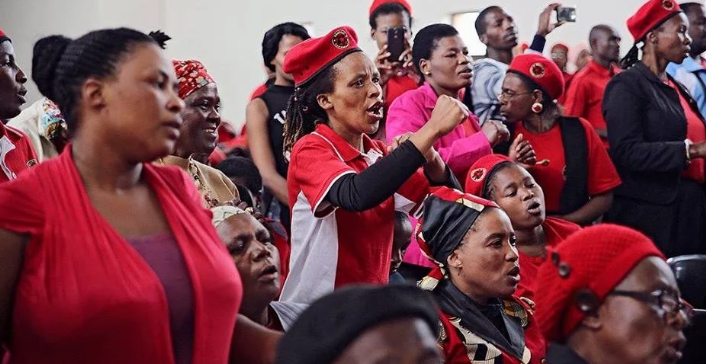Durban Shack Dwellers’ Movement Wins Two Key Legal Battles Against Municipality, ANC

Abahlali baseKhenana's struggle began in 2013 when over 1,000 people occupied land in Cato Crest in Durban.
The shack-dwellers’ movement, Abahlali baseKhenana, the Durban counterpart of the Abahlali baseMjondolo, won two legal battles last month against attacks on their dwellings at Cato Crest in the eastern South African city. The first was the interdiction won at the Durban High Court, on February 13, against attacks from the anti-land invasion unit of the Durban municipality, which sought to evict and relocate 109 families from their dwellings in ‘eKhenana’. The second victory was the expulsion of the supporters of local African National Congress (ANC) leader Mzimuni Ngiba, who attacked and forcibly occupied the land to undermine the interdiction, by the order of a magisterial court on February 27. The two legal victories are quite significant in a struggle that has been going on for several years.
The struggle began in March 2013, when over 1,000 people occupied a piece of land in Cato Crest in Durban or eThekwini in the province of KwaZulu Natal. The movement was inspired by the anti-evacuation and shack dwellers’ struggle that were gaining national attention across South Africa, especially the Abahlali movement. The movement in Durban had its origin with a blockade by residents of the Kennedy Road shanties in 2005.
The occupied land in Cato Crest was named ‘Marikana’ in honor of those murdered in police firing during the 2012 mine workers’ strike in Marikana in the North West province of South Africa. The occupation and the movement emerged in response to the failure of the successive ANC governments in fulfilling the party’s promise of homes for the homeless. The Durban occupation of 2013 was later called eKhenana, which can be roughly translated as ‘place of hope’, and the movement came to identify itself as Abahlali baseKhenana, denoting its allegiance to the countrywide Abahlali movement.
The occupation, at the very outset, was met with hostility by the ANC-dominated municipality, especially its Durban leader Mzimuni Ngiba, who was chased out of Cato Crest during the occupation itself. The eThekwini municipality is notorious for deploying its anti-land invasion unit, which, along with the police, became known for their indiscriminate violence on the shack-dwellers. Apart from the violence, the municipality undertook several demolition drives. During one such drive, around 50 houses were either demolished or burnt down by the anti-land invasion unit. The municipality also neglected the residents of eKhenana, most of whom lack proper toilet facilities, drainage and sewerage, and access to clean drinking water, leading to the spread of diseases in the area.
A case was eventually filed in December 2018 at the Durban High Court against the constant threat of evictions. The February 13 interdiction by the court afforded relief to residents from the constant pressures and attacks of the municipality. The interdiction itself caused a split within the local ANC unit, with Ngiba, who is also a councillor for Cato Manor, strongly opposing the court verdict, while most of the ANC members in the municipality, including the mayor, begrudgingly accepted it.
In the week following the verdict, ANC supporters of Ngiba started to illegally occupy the eKhenana lands, in a bid to undermine the interdiction. Their attempt was to occupy more lands in the area in a bid to force the municipal authorities to either evacuate everyone or nobody. But the plan failed as the ANC-led municipality itself filed a case, seeking the the eviction of Ngiba’s supporters on February 22, and secured the eviction order by the Durban magistrate court by February 27.
According to Abahlali baseKhenana, the decision by the municipality to approach the court for the eviction set a good precedent. Previous eviction attempts were without any backing of a court order, and on many occasions, were reportedly without even a proper eviction notice from the municipality. The municipal government approaching the courts for an eviction, along with the halting of the activities of the anti-land invasion units, thus mark two key victories for the shack dwellers’ movement in Durban.
Get the latest reports & analysis with people's perspective on Protests, movements & deep analytical videos, discussions of the current affairs in your Telegram app. Subscribe to NewsClick's Telegram channel & get Real-Time updates on stories, as they get published on our website.
























